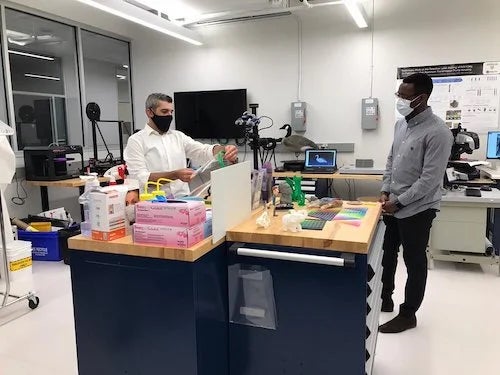Editor:
Brandon Sweet
University Communications
bulletin@uwaterloo.ca
Astrophysicists release largest 3D map of the universe ever created

This is an excerpt of an article originally published on Waterloo Stories.
Astrophysicists have filled in 11 billion years in our picture of the universe with the release of a comprehensive analysis of the largest three-dimensional cosmic map ever created.
“This is one of the most substantial advances in cosmology in the last decade,” said University of Waterloo professor Will Percival, a lead researcher on the work.
“Over the last 20 years, the Sloan Digital Sky Survey (SDSS) has created a series of surveys that now span a period of 11 billion years of cosmic history,” said Percival, who holds a joint position between the University of Waterloo and Perimeter Institute and is the Survey Scientist for the latest SDSS survey. “We have worked to fill in that gap, and we are now using that information to gain a better understanding of this period in our universe.”

Image credit: Anand Raichoor (EPFL), Ashley Ross (Ohio State University) and the SDSS Collaboration*
The new results come from the extended Baryon Oscillation Spectroscopic Survey (eBOSS), an international collaboration of more than 100 astrophysicists that is one of the SDSS’s component surveys. At the heart of the new results are detailed measurements of more than two million galaxies and quasars covering 11 billion years of cosmic time.
The results represent the culmination of 15 years of work for Percival, who is the Director of the Waterloo Centre for Astrophysics at the University of Waterloo – where he holds the Mike and Ophelia Lazaridis Distinguished Chair in Astrophysics – and an associate faculty member at Perimeter. He has held various management roles within SDSS, including his current one on the eBOSS management team. As the collaboration prepared to simultaneously release 23 papers representing over 500 pages of new science, Percival was essentially tasked with ensuring the scientific rigor of their results.
In their analysis of the SDSS data, the eBOSS team has created a map (above) that reveals the filaments and voids that define the structure in the universe, starting from the time when the universe was only about 300,000 years old. From this map, researchers measure patterns in the distribution of galaxies, which give several key parameters of our universe to better than one percent accuracy. The signals of these patterns are shown in the insets in the image.
This map represents the combined effort of more than 20 years of mapping the universe using the Sloan Foundation telescope.
“The data released before now have significant legacy value, and have been widely used for many different astrophysical analyses from studies of individual stars through to studies of galaxies and the universe as a whole,” said Dustin Lang, a computational scientist at The Perimeter Institute who helped to put together this data. “It really is incredible that one experiment has produced such a scientific legacy.”
Read the rest of the article on Waterloo Stories.
Responding to inequity in our post-COVID-19 world

By Angelica Sanchez. This article was originally published on Waterloo Stories.
The pandemic has highlighted existing issues of equity in our society such as the value of work, gender roles, universal basic income and racial profiling. While many in our community are waiting for the world to return to pre-pandemic life, we should be asking ourselves what is considered “normal” to each individual?
During Wednesday’s final Beyond the Headlines community lecture two-part series, moderated by CBC Radio One’s Craig Norris, University of Waterloo researchers explored whether our post-COVID society may be more responsive or more divisive to systemic issues of equity.
Inequity in the labour market
When the pandemic increased fears in March, Mikal Skuterud, a professor in the Department of Economics and labourer economist, was immediately interested in seeing the impact of COVID-19 on the labour market.
“It has been very unequal. The workers that have been impacted by this have been workers in the lower end of the labour market — workers with low wages, minimum-wage workers and hourly paid workers,” Skuterud said. The workers who were impacted the most are currently showing the smallest numbers in terms of recoveries, he added.
At the time, Statistics Canada didn’t have any data collection for the different racial and ethnic groups of individuals in the labour force survey. However, Skuterud explained that by looking at the census, we could identify the occupations that different race groups work in. Skuterud concluded that the groups that have been impacted the most in Canada were Black women.
Katy Fulfer, professor in the Department of Philosophy, highlighted the fact that women do most of the paid and unpaid care work globally. She further explained that when we look at long-term care homes in Canada, 90 per cent of paid staff are women. The problem is that most research studies don’t provide racial demographics, even though it’s important information to have when discussing inequity.
“Seeing that interconnection between public health, social justice and the need to address these structural inequities — I think is very important.”
The need for political will
These are not changes that can happen overnight, but that doesn’t mean we shouldn’t push in that direction, Skuterud said. Pandemics are difficult but it’s times like this that lead to change — it forces us to think about our actions.
“One thing we must understand, particularly in this space we are in today, there is considerable trauma, pain and violence being thrown onto bodies like mine,” Christopher Taylor said, lecturer in the Department of History and has worked for the Ontario Public Service (OPS).
“It’s the political will that people must seek to make changes,” Taylor added. “We can start by listening to marginalized voices, to understand their position and then take action. We have the power to vote and make changes to policies and systems.”
Adding to challenges, when it comes to race and inequity, Taylor said that we must also tie in how climate crisis globally impacts racialized individuals more than anyone else. For example, migrant workers who live on islands that people pay to visit for vacations — rising sea levels could wipe out those islands, the residents and their economies.
“My hope is that we continue pushing. These small improvements are just a small victory,” Fulfer said. “But I think seeing more of these interconnections will be helpful.”
Beyond the Headlines: Responding to inequity in our post-COVID world, is the final of the two-part online series, hosted by the University of Waterloo in partnership with CBC Kitchener-Waterloo.
For more discussions like these, register for Waterloo’s latest Innovation Summit on Wednesday, July 22 from 9 to 10 a.m. as industry leaders explore the critical need of a resilient and adaptable workforce in the face of global disruption. Themed “Reset. Rebuild. Rebound,” join the conversation as guest speakers like Randall Lane, chief content officer and editor of Forbes Magazine, seek to attract trailblazers in industry, government and research for a no-holds barred immersion into technology, disruption and emerging trends.
Register for the Waterloo Innovation Summit
Minister visits campus and other notable notes

Minister of Colleges and Universities Ross Romano looks at 3D-printed face shields with Francis Dibia, internal and external services coordinator for the Multi-Scale Additive Manufacturing Lab (MSAM).
The Honourable Ross Romano, Minister of Colleges and Universities, visited the University of Waterloo campus last week. Minister Romano met with researchers from Waterloo’s Autonomous Vehicle Research and Intelligence Lab (AVRIL) and the Multi-Scale Additive Manufacturing Lab (MSAM) to learn more about Waterloo’s unique creator-owned IP policy and see first-hand the transformative, industry focused research taking place which will help to continue to spur economic growth as Ontario recovers from COVID-19. The Minister also thanked MSAM researchers who have been helping Ontario’s response to the COVID-19 pandemic by 3D-printing personal protective equipment (PPE).
"This is a really strange time to be starting a new job," says a note from the Faculty Association of the University of Waterloo (FAUW). "It's hard to meet fellow new faculty in other parts of Waterloo at any time, but this year is even harder. To help combat the isolation, the Faculty Association invites new faculty members to gather on Zoom this summer to meet colleagues from across campus who are also going through this experience. FAUW Board members will also be there to answer any questions you have about how things work at Waterloo." FAUW emailed Zoom call links to all the new faculty members that they were aware of, but if they missed you (or you can't find FAUW's invitation email), send a request via email to laura.mcdonald@uwaterloo.ca to get the links.
Link of the day
100 years ago: colour comes to car culture
When and Where to get support
Students can visit the Student Success Office online for supports including academic development, international student resources, leadership development, exchange and study abroad, and opportunities to get involved.
Instructors can visit the Keep Learning website to get support on adapting their teaching and learning plans for an online environment. The following workshops are current offerings from the KL team (CTE, CEL, ITMS, LIB):
Getting Ready to Facilitate Online Courses: TA Training, beginning July 13.
Active Learning Online Part 1, Tuesday, July 21, 10:00 a.m.
Akindi Training Session, Wednesday, July 22, 1:00 p.m.
Employees can access resources to help them work remotely, including managing University records and privacy of personal information
Interested in learning more about engaging your students in an online course? The Centre for Extended Learning has created a new resource for you called "Fostering Engagement: Facilitating Online Courses in Higher Education"
ThisOpen Educational Resource was designed for post-secondary instructors and teaching assistants who would like to better understand the critical role of facilitation in online course delivery, and build practical skills and strategies that are relevant, effective, and authentic.
Here are some tips for staying healthy while working from home.
The Writing and Communication Centre has gone virtual. We have many online services to help you meet your goals, including: Virtual Pre-booked and Drop-in appointments, Online workshops, Virtual Grad and Faculty Writing Cafés, Instagram Live Q&A sessions, Live PJ-Friendly Write-ins, Online learning resources, and Online programming for Master’s and PhD students. Whatever you’re working on, we’re here to help! Visit our website for more information.
We understand that these circumstances can be troubling, and you may need to speak with someone for emotional support. Good2Talk is a post-secondary student helpline based in Ontario, Canada that is available to all students.
If you feel overwhelmed or anxious and need to talk to somebody, please contact the University’s Campus Wellness services, either Health Services or Counselling Services. You can also contact the University's Centre for Mental Health Research and Treatment.
The Library has published a resource guide on how to avoid information overload.
The Faculty Association of the University of Waterloo (FAUW) continues to advocate for its members. Check out the FAUW blog for more information.
The University of Waterloo Staff Association (UWSA) continues to advocate for its members. Check out the UWSA blog for more information.
WUSA supports for students:
Food Support Service food hampers are currently available from the Turnkey Desk on weekdays from 9:00 a.m. to 4:00 p.m. in the Student Life Centre. If you have any questions please email us at foodsupport@wusa.ca.
MATES – Providing general online Peer Support via Skype to undergraduate students. To set up an appointment, please go to: https://wusa.ca/peersupport
Glow Centre - Providing online Peer Support for the LGBTQ2+ community via Skype to Undergraduate students. To set up an appointment, please go to: https://wusa.ca/peersupport
The Women’s Centre– Providing online Peer Support via Skype to undergraduate students. To set up an appointment, please go to: https://wusa.ca/peersupport
RAISE– Providing online Peer Support via Google to undergraduate students. To set up an appointment, please go to: https://wusa.ca/peersupport
The Bike Centre – Now open by appointment for your bicycle repair and rental needs in the Student Life Centre. For more information or to schedule an appointment, please go to: https://wusa.ca/bikecentre
Centre for Academic Policy Support - CAPS is here to assist Waterloo undergraduates throughout their experience in navigating academic policy in the instances of filing petitions, grievances and appeals. Please contact them at caps@wusa.ca. More information at http://wusa.ca/caps
WUSA Commissioners who can help in a variety of areas that students may be experiencing during this time:
- Equity – equity@wusa.ca
- Co-op and Experiential Affairs – coop.affairs@wusa.ca
WUSA Student Legal Protection Program- Seeking legal counsel can be intimidating, especially if it’s your first time facing a legal issue. The legal assistance helpline provides quick access to legal advice in any area of law, including criminal. Just call 1-833-202-4571.
Empower Me is a confidential mental health and wellness service that connects students with qualified counsellors 24/7. They can be reached at 1-844-741-6389.
When and Where (but mostly when)
Warriors Coaching Clinics. Every Wednesday from June 3 to July 15. Free online sessions highlighting a wide range of topics featuring Warriors Coaches and staff. Register in advance for the zoom link.
Healthy Warriors at Home. Free programming including Online Fitness, Personal Training, Health Webinars, Personalized Nutrition and more. Open to students, staff, faculty and alumni. Register today.
Waterloo Warriors Online Camps. Online youth experiences including basketball, hockey and multi-sport camps for a variety of ages. Starting at $48.00/week. Register today.
Warriors Big 6 Summer Challenge. Weekly challenges from July 13 to August 23 focusing on Movement, Sleep, Hydration, Nutrition, Apps and Choose your own adventure. Post your photo and tag @WlooRec on Instagram for a chance to win a $100 box from truLOCAL each week as well as $100 from Mel’s Diner for our grand prize winner. Stay healthy Warriors!
Clarity in scientific writing, Monday, July 20, 2020, 1:00 p.m., Live Q & A on LEARN.
AHS Live Chat, Tuesday, July 21, 11:00 a.m. to 12:00 p.m.
NEW - Waterloo Innovation Summit, Wednesday, July 22, 9:00 a.m.
Akindi Live Training (Webinar), Wednesday, July 22, from 1:00 p.m. to 1:45 p.m.
Say it in your own words: Paraphrase & summary for graduate students, Thursday, July 23, 9:00 a.m., Live Q & A on LEARN.
NEW - Taking Action Against Online Harassment. Learn how to communicate in virtual spaces, through text and social media, in a supportive and safe manner. Discussion includes how online violence - including sexual harassment, happens, and participants will gain tools and skills for negotiating respectful communication. Thursday, July 23, 1:00 p.m. to 2:30 p.m.
New Faculty Online Social, Thursday, July 23, 2:30 p.m.
NEW - Alumni Family Day, Saturday, July 25, 10:00 a.m. to 5:00 p.m., online.
NEW – Human Rights, Equity and Inclusion seminar, Equitable Recruitment & Selection (Faculty only, offered anytime through Learn), Monday, July 27, 1:00 p.m. to 4:00 p.m.
NEW - Environment Live Chat, Wednesday, July 29, 11:00 a.m. to 12:00 p.m.
NEW - Science Innovation Hub Skills Development Workshop: Figure Making 101, Wednesday July 29, 3:00 p.m.